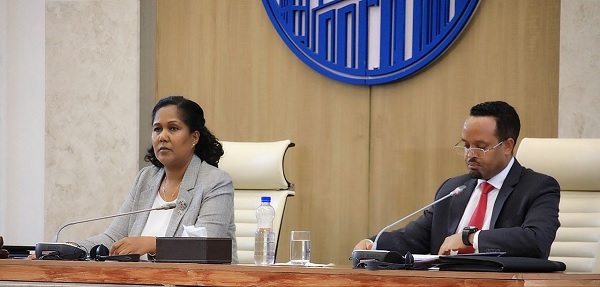
The Ethiopian government budget shows a process by which the government decides on the amount of tax to be collected, the services to be provided, and the amount of debt to take on in order to accelerate economic growth and job creation opportunities, modernize infrastructure, and eradicate poverty and inequality. To realize this, the government should inform and engage citizens on these essential decisions that impact their lives by producing a guide on the fiscal year budget document.
The government of Ethiopia prepares a Citizens Budget Guide document for its citizens annually to provide an understanding of how the budget affects their lives. The document is one of such tools that allow people to control the filling and spending of the national budget.
According to the information obtained from the Ministry of Finance, the Ethiopian government budget process has four stages, namely, budget preparation, budget approval, budget implementation, and budget reporting and oversight at all levels of jurisdiction, which is guided by the financial calendar directive issued by the Ministry of Finance to all public budgetary bodies.
Activities like the preparation of the Macro-Economic and Fiscal Framework, the submission of budget requests by budgetary bodies, and budget hearings for negotiation are undertaken in the budget preparation stage before the beginning of the fiscal year. The tabled budget is due to be approved by the parliamentary committee in the approval stage.
Before the budget is distributed to public bodies to implement activities, the finance ministry monitors spending requests for legislative approval of the adjustment budget if necessary under the implementation stage during the fiscal year.
Finally, the Federal Auditor General, along with parliaments, audits public bodies’ accounts and performances in the reporting and oversight stage at the end of the fiscal year.
The government of Ethiopia drafted a national budget of 1.93 trillion birr for the 2018 Ethiopian Fiscal Year (EFY), which is odd in the history of the budget allocation of the country.
Over the week presenting the 2018 Ethiopian Fiscal Year (EFY) draft budget at the 35th regular session of the House of People’s Representatives, Minister of Finance Ahmed Shide said that Ethiopia’s draft budget for the upcoming fiscal year would play a significant role in ensuring the successful continuity of the comprehensive macroeconomic reforms.
Considering medium-term macro-economic growth, special attention was given to debt reduction and inflation in the draft budget proclamation, he added. He disclosed that the budget for the 2018 Ethiopian Fiscal Year (EFY) is 1.93 trillion Birr.
According to him, the budget aligned with the country’s Ten-Year Perspective Plan (2021-2030) emphasizes continuity with long-term development goals. The proposed budget clearly lays out where the money will go, highlighting the government’s key spending areas.
A large portion, 1.2 trillion birr, is allocated for recurrent expenditures, which covers the day-to-day operations of the government. For development projects and infrastructure, 415 billion birr has been set aside as capital expenditures. Regional governments will receive 315 billion birr in direct support, and an additional 14 billion birr is specifically earmarked to help regions achieve their Sustainable Development Goals (SDGs).
Explaining the predicted revenue sources to fund this ambitious budget the Minister said that significant one trillion birr, representing 73% of the total, is expected to come from tax revenue. International development partners are projected to contribute 236 billion birr, with the remainder of the funds generated from project support and various miscellaneous revenues.
Citing fiscal health, Ahmed said that a gross budget deficit of 2.2% is observed relative to the Gross Domestic Product, with the net deficit standing at 1%. The minister assured lawmakers that the government intends to cover this deficit through the sale of treasury bills rather than direct borrowing from the National Bank.
He further mentioned that preparations have been made to integrally implement the planned reforms in tax policy and tax administration to achieve the targeted tax revenue.
The fact that the government was able to complete the budget year without borrowing money from the national bank is an indication of financial efficiency, adding that the draft budget is designed to complete development projects that have been started and to build a stable macro economy.
The draft proclamation is intended to achieve sustainable development goals by increasing and strengthening domestic revenue and creating a healthy financial system Ahmed underlined.
Emphasizing the budget challenges encountered by the newly established regional states, the Minister said that they should strengthen their internal financial capacity and review their human resource structure to solve the challenges.
Since the basic development needs that are being raised among the people are numerous, the members of the house urged the Ministry to consider the implementation of projects in the draft proclamation.
The members of the house indicated that the draft proclamation should be headed by a standing committee to ensure the implementation of price inflation, conflict-affected institutions, and infrastructure projects. Also, the members urged the need to monitor and control the budget allocated to budget-funded agencies to ensure that they use it for the intended purpose.
After discussing the drafted budget proclamation, the house referred it to the Budget, Planning, and Finance Affairs Standing Committee for detailed consideration.
Deputy Speaker of the House of People’s Representatives Lomi Bedo speaking at the 23rd Annual Regular Conference of the Federal Auditor General said that the government and public resources must be kept safe from misuse and need to be spent on the intended purpose.
Explaining the negative effect of improper use of the government budget Lomi said that the corrupt practices of institutions erode trust in the government and reduce public satisfaction, leading to an increase in public grievances. Therefore, institutions at all levels should avoid corruption and corrupt practices and fulfill their responsibilities properly and follow a financial system that can meet the country’s development needs.
She also explained that there should be audit offices with guaranteed independence in order to ensure transparency and accountability in institutions and to take legal action against bodies that are the source of corrupt practices.
Federal Auditor General Meseret Damtew, on her part announced that a uniform system has been developed and is being implemented in audit firms both at federal and regional levels to protect the country’s resources from corruption and embezzlement.
She added that efforts are underway to draw lesson from the experiences of other countries and set global standard for the audit service.
BY TAMERU REGASA
THE ETHIOPIAN HERALD FRIDAY 13 JUNE 2025


